In this post, we are going to be looking at Chevy 802 heads and establish whether or not they are any good. If this is something that you are interested in, then stick around. Released in the late 70s, the 882 heads were made of cast iron and were the heavier heads common in their times and in their predecessors.
Today, we see lighter and lighter aluminum heads which arguably give better performance. The original 882 heads to be released were prone to cracking but this issue was eventually solved as GM gained a better understanding of them.
This is one of the main reasons that you will get different and passionate debates for or against them. It sometimes boils down to the fact that the experiences owners had were based on whether they got the earlier or later versions.
What are 882 Chevy Heads
882 heads were designed by Chevy to be used in 350 ci and 400 ci engines. The reason that the earlier iterations of this engine cracked was due to the fact that they ran really hot. This was due to the double heat riser passage. The 882s are quite similar to 84-86E 462624 heads.
As far as performance is concerned, the 882s sit somewhat on the fence. They are not the best heads and not the worst either; they sit somewhere in the middle.
You will not find a lot of people recommending them to anyone with a lot of passion. They definitely are good to have if you really do not have a better option but no one will be raving about them.
Are 882 Chevy Heads Good?
We kind of started off on this issue earlier on but let’s get into a bit more detail. For the time the 882 Chevy heads were launched in the late 70s, they were pretty good for their time.
Made of cast iron, they are on the heavy side, especially when compared with newer heads. As already stated, the first-gen heads were prone to cracking.
It is expected with every new technology that the first generation models will often have several issues that slip through pre-launch testing and will only come up in real-world applications as owners give feedback.
To GM’s credit, they managed to take care of the issues that were raised in the first two years of these heads being used and were able to bring out a much-improved product by year 3.
Fast forward to today and the 882s are still being used. The only difference though is that they are found less and less in daily drive vehicles and more in modified race cars where they have pushed o the limit and then discarded once used. The fact that they are relatively cheap also has a good deal to do with it.
When you ask most enthusiasts though, they will tell you that there are better and lighter aluminum options available on the market today that will far outperform the 882 heads on any given day. Again, they are not terrible heads but they are not the best either.
Should You Consider the chevy 882 heads?
Most likely, the reason you have read this far is largely due to the fact that you are considering getting the 882 heads. Here are a few thoughts for you to consider. First of all, don’t go with these for the long term but rather think of them as a stop-gap.
There are better options out there if you are buying. Some would argue that the only reason you would run the 882s is if they came free.
If you want to do the occasional racing on a car specifically designated for that, then these heads will be ideal for you. Having said that, don’t ever run nitrous through them. You will most likely significantly damage them.
Conclusion on 882 heads
Hopefully, this article has helped you get a better understanding of the 882 heads. To wrap it up, our advice when it comes to the 882 is to steer clear of them if you want something that will last for the long term.

Tomas is a retired Chevy Auto Technician that brings decades of hands-on experience and expertise to the table. He’s also a father to two incredible daughters. He enjoys using his knowledge and experience to help you solve and find reliable information on Chevrolet vehicles. Whether it’s troubleshooting engine problems or providing tips for maintenance, Thomas is committed to helping Chevy owners keep their vehicles running smoothly and safely.



